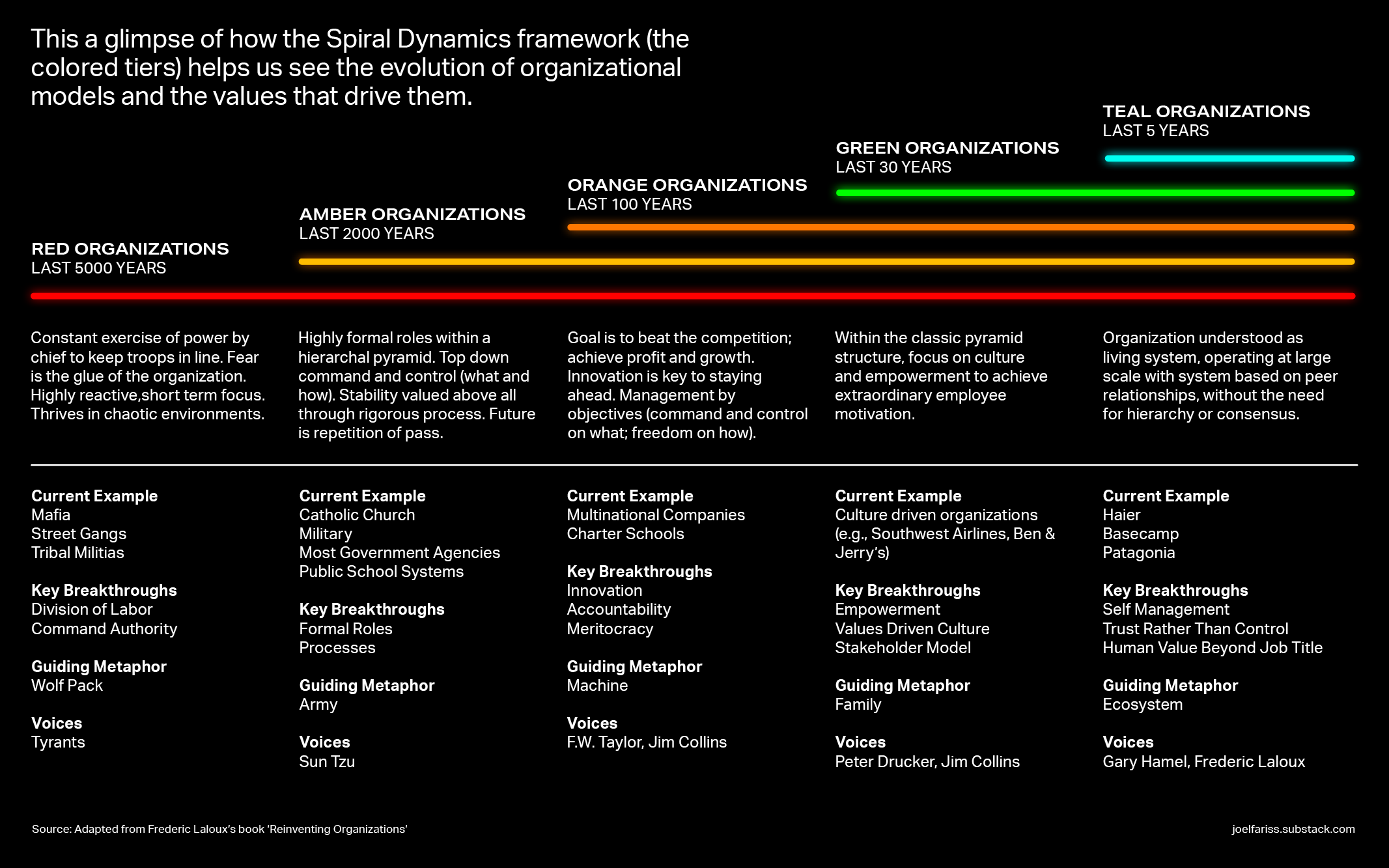“Throughout history the types of organizations we invented were tied to the prevailing worldview and consciousness. Every time we as a species have changed the way we think about the world, we have come up with more powerful types of organizations.”
– Frederic Laloux
Hi friends.
In my email last Thursday (introducing my second new podcast BRONTIDE,) I mentioned the course I developed with Trace Bell and Tina Olsen titled ‘The History of Human Collaboration and the Future of Work.’ I wanted to follow up and extend an invitation to your organization to participate. I believe these kind of learning opportunities are exponentially valuable, and critical for the continual organizational expansion of consciousness we desperately need. I also know some of you may be looking for opportunities to spend your professional development budget as the year / quarter comes to an end. ;)
According to the Microsoft work trends report, 76% of employees say they’d stay at their company longer if they could benefit more from learning and development support.
ABOUT THIS COURSE
So, why create a course for organizations to learn about the history of human collaboration? Well, in the last three years, work has seen unprecedented disruption. The great resignation. Mental health crisis and burnout. Empty offices. Loneliness. How we work, where we work, and the very idea of work itself now lives in a state of immense volatility and uncertainty.
How did we get here? And more importantly, where are we going? Is work just a meaningless Sisyphean grind? Or could work be more? Something edifying, worthwhile, and human.
What if our work incentivized us to live into our authentic selfhood, to honor our callings, and break from the enchantments of privileged consumption? What if work evoked a sincere joy as an opportunity to focus our attention and care toward something worth nurturing? What if work was an engine of wellbeing, self actualization, and true belonging?
There has never been a better time to reexamine the beliefs that drive the nature and form of how our teams work, yet most of us don’t have the time or even know where to start. If you identify with that sentiment, this course is your answer!
Over the course of two half days, we’ll cover the history of human collaboration, the belief systems that have shaped ‘work’ over the course of civilization, and how all this implicates us today. With a group of peers in corporate real estate, human resources, and program management, you’ll make sense of the challenges we face and have space to reflect on the critical decisions you are making for your team and your organization.
Relying primarily on the Spiral Dynamics framework, this course will summarize 5,000 years of organizational and management evolution. Ken Wilbur’s integral theory, Carl Jung’s archetypes, structural stage theory, Evan Thompson’s embodied enaction, and Erik Erikson’s psychosocial development will also inform this learning program. This work collectively speaks to the unfolding human meta-ethic that drives social organizing and cooperative behavior. It is a college-level course rich in sociology, psychology, and philosophy. Not only does this course explain how work became what we know it to be today, it provides us with the necessary context to begin envisioning the kind of work we want tomorrow.
WHO IS THIS COURSE FOR?
This course was created for teams who want an opportunity to design an experience of work that is healthy and fulfilling. Those in Human Resources, Facilities and Real Estate, Research, and Product Teams are all welcome!
WHAT WILL I GAIN FROM THIS COURSE?
You’ll have an advantageous perspective that positions you ahead of change, and equips you to make sense of the complexity we face today. You’ll gain an understanding of the meta forces shaping ‘work,’ an understanding of the personal convictions driving your decision making, and a personally tailored vision for your team’s working experience, grounded in the convictions of your organization. And just as important, we’re excited to provide you with a rare experience – space for reflection and the opportunity to connect with your teams and your peers.
As the year comes to a close, I encourage you to think about this course for your team, and invite friendlies and collaborators outside your org who are partners in solving some of the dynamic challenges you are facing today.
If you’re interested in learning more, shoot me an email joel_fariss[at]gensler.com – I’d love to chat with you.





